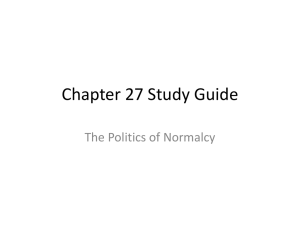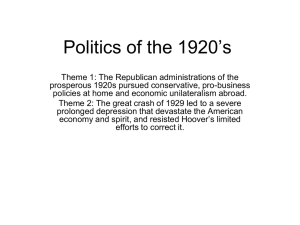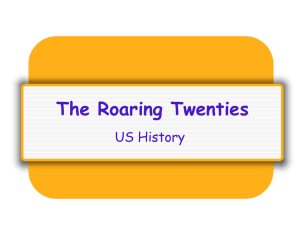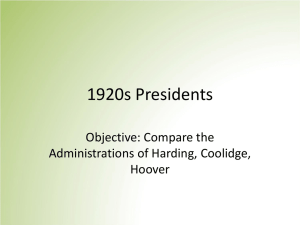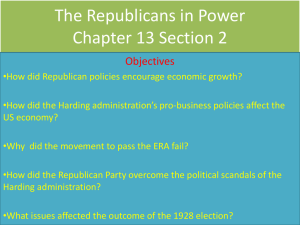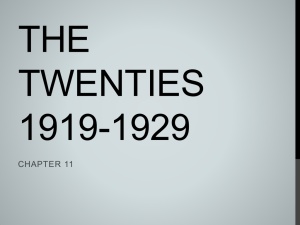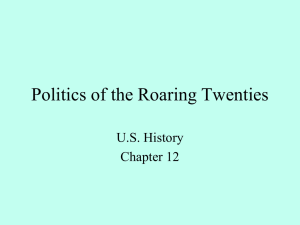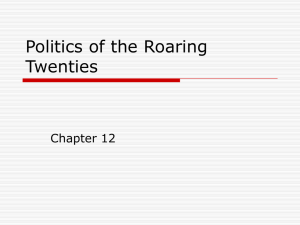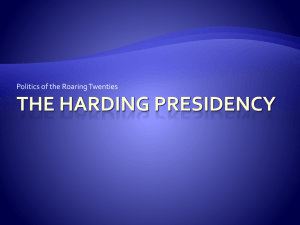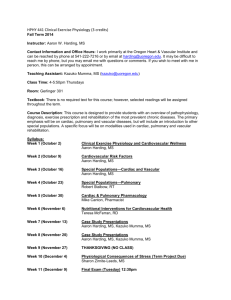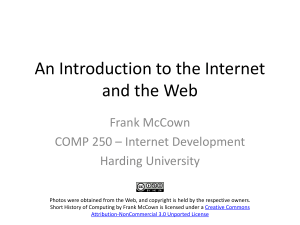Reg_US_Chapter_16
advertisement
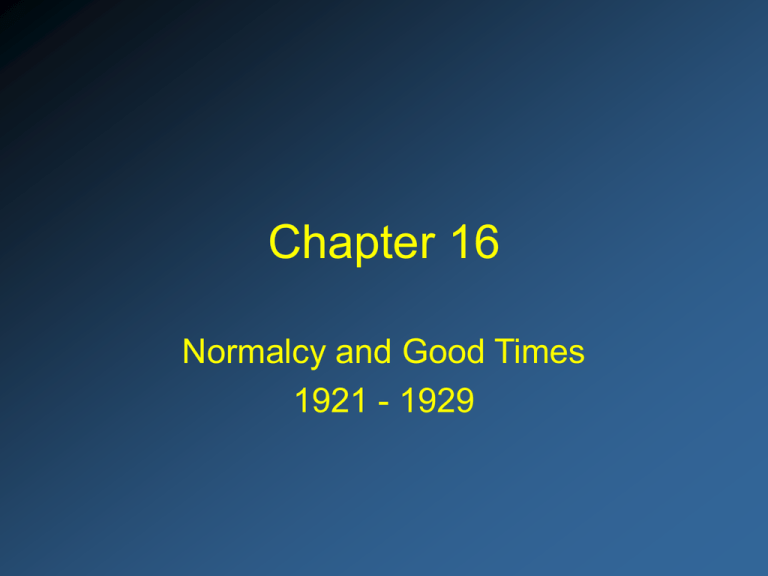
Chapter 16 Normalcy and Good Times 1921 - 1929 Presidential Politics • The Harding Administration Product of the Ohio political machine Won the presidency in 1920 on the slogan “Return to Normalcy” – a return to normal life after WWI Harding very popular I wonder how many of these kids are gonna pass the quiz? President Warren G. Harding Presidential Politics • The Ohio Gang I heard that we won’t even get to use notes on the quiz!! Oh Crap! What will we do now? Maybe we’ll actually have to study!! Harding gave many government posts to friends and political allies who were former poker-playing buddies These friends sold jobs, pardons, and medical supplies from VA hospitals Presidential Politics • Harding died of a heart attack • Teapot Dome and other Scandals Sec of Interior, Albert Fall, allowed private companies to lease lands containing US Navy oil reserves Fall convicted – sent to prison AG Harry Daugherty – claimed immunity or freedom from prosecution Forced to resign after taking bribes The Presidents - Harding Presidential Politics • The Coolidge Administration Honest and capable Took office upon death of Harding Believed that prosperity rested on business leadership Kept government out of the way of business President Calvin Coolidge Presidential Politics • The Election of 1924 Took Democrats 103 attempts to find a candidate that was acceptable – John Davis Coolidge ran on slogan “Keep Cool with Coolidge” Farm. Labor, and religious activists formed the Progressive Party and nominated Robert La Follette Coolidge won the presidency A Growing Economy • American wages increased while work hours decreased • Mass Production – large-scale product manufacturing usually done by machinery created more supply and reduced consumer costs A Growing Economy • The Assembly Line First adopted by carmaker Henry Ford Divided operations into simple tasks that unskilled workers could do and cut unnecessary motion to a minimum Building one car went from 12 hours to 93 minutes A Growing Economy The Model T – price in 1908 was $850, in 1914 $490, and in 1924 $295 Lower the cost of the car – increase volume of sales Ford undercut unions by raising wages to $5 a day and reducing work hours to 8-hour shifts Ford’s success brought competition from new companies General Motors and Chrysler “You can get the car in any color you want as long as it’s black” – Henry Ford A Growing Economy This would be so cool if we actually had some gas! The auto industry spurred growth in other industries including rubber, glass, nickel and lead The automobile went from a rich man’s toy to a necessity for the middle class Commuting became a new phenomenon A Growing Economy • Consumer Goods Industry More disposable income spurred new products like electric razors, disposable tissue Labor-saving devices like electric irons, vacuum cleaners, and washing machines More emphasis on fashion and personal care like mouthwash, deodorants, and cosmetics A Growing Economy • The Airline Industry Wright Brothers Glenn Curtiss Made innovations in design that allowed rigid wings and much larger aircraft Invented first flying boat Charles Lindbergh 1927 first solo flight across Atlantic Plane named Spirit of St. Louis A Growing Economy • The Radio Industry 1926 National Broadcasting Company (NBC) established By 1927 almost 700 radio stations dotted the country 1928 Columbia Broadcasting System (CBS) created coastto-coast network Radios provided entertainment in home and advertising A Growing Economy • Higher wages / shorter hours created national spending spree • Easy consumer credit caused many Americans to go into debt to buy goods • Pre-1920’s debt was considered shamefulnow attitudes changed • Many bought products on “installment plan” A Growing Economy • Industries began to develop more complex structure requiring the hiring of managers • Caused the rise of business schools • Expanded the size of the middle class • Welfare Capitalism – companies allowed workers to buy stock, profit-share, and receive medical care and pensions A Growing Economy • Unions lost influence due to more generous benefits from management • Businesses promoted the Open Shop – workplaces where employees were not required to join the union • Farmers left out of the prosperity of 1920’s • Technology allowed more crops but demand remained low • The Fordney-McCumber Act raised tariffs that actually decreased demand for US farm products Policies of Prosperity • The Mellon Program What are you looking at? Secretary of the Treasury – Andrew Mellon Andrew Mellon was Secretary of the Treasury under Harding, Coolidge, and Hoover Mellon focused on reducing debt, balancing the budget, and lowering taxes The idea that lowering taxes would cause people to spend more and thus the government would collect even more taxes is called supply-side economics Policies of Prosperity • Secretary of Commerce Herbert Hoover • Encouraged manufacturers and distributors to form their own trade associations which would voluntarily share information with the federal government - This was called cooperative individualism • This would reduce costs and promote economic efficiency Secretary of Commerce Herbert Hoover Policies of Prosperity • Trade and Arms Control After WWI, America was the dominant economic power in the world Most Americans did not want their country involved in world affairs. This was called isolationism America was too powerful NOT to be a part of the world Policies of Prosperity • The Dawes Plan (Charles Dawes) European Allies owed US money from war but they could not make the payments The Allies were making Germany pay reparations – payments as punishment for starting the war Germany could not pay US made deal that US would loan money to Germany to pay the Allies so the Allies could pay the US Policies of Prosperity • The Washington Conference Meeting of US and eight major countries to halt arms race Secretary of State Charles Evan Hughes proposed a 10-year moratorium (a pause) on construction of warships The Kellogg-Briand Pact – US and 14 nations signed pact to ban/outlaw war Treaty Four Power Treaty Signers US, Great Britain, France, Japan Terms All agreed to respect each other’s territory in the Pacific Weaknesses Mutual defense of other co-signers not specified Full and open negotiations in event of disagreements Five Power Treaty Nine Power Treaty US, Great Britain, France, Japan, Italy US, Great Britain, France, Japan, Italy, Belgium, China, The Netherlands, Portugal All agreed to freeze naval production at 1921 levels and halt production of large warships for 10 years No restrictions on construction of smaller ships such as submarines and destroyers US and Great Britain would not build new naval bases in the Western Pacific Did not place restrictions on land forces All agreed to preserve equal commercial rights to China – a reassertion of the Open Door Policy No enforcement of the terms of Open Door Policy specified Quiz • President Coolidge’s simple and frugal manner contrasted with the booming, materialistic era called the… • Roaring Twenties • Harding’s Secretary of the Interior, Albert Fall, was implicated in what scandal? • Teapot Dome • What system of production was adopted by Henry Ford • The Assembly Line • To create consumers for their products, manufacturers turned to… • Advertising Quiz • Henry Ford changed the automobile from a toy of the wealthy to a necessity of the… • Middle Class • What crippled the German economy after WWI? • Reparation payments • What was Hoover’s philosophy regarding business and government? • Cooperative individualism • Friends of President Harding who were appointed to government jobs were called… • The Ohio Gang Quiz • What raised tariffs to protect US businesses (but hurt farmers)? • The Fordney-McCumber Act • What was the policy of avoiding involvement in foreign affairs? • Isolationism • What is large-scale manufacturing usually be machinery called? • Mass production • A fancy word for a pause in something… • A Moratorium Quiz • What pact or agreement outlawed war? • The Kellogg-Briand Pact • What was Harding’s campaign slogan in 1920? • Return to Normalcy • What is another word for freedom from prosecution? • Immunity
